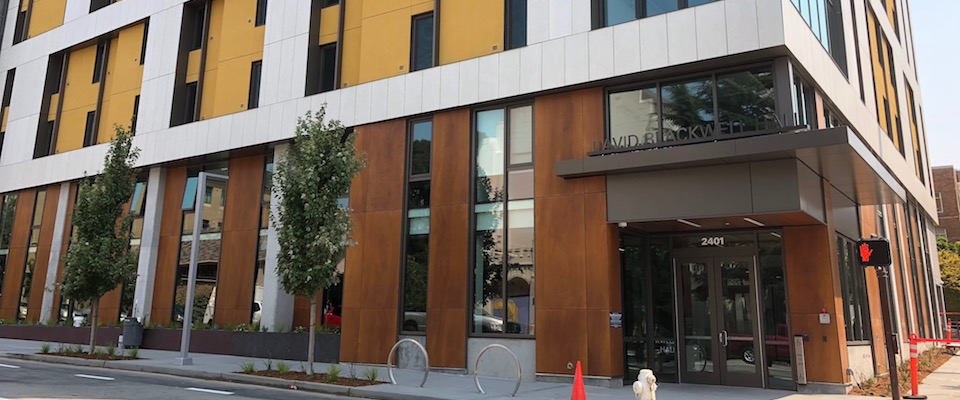After 18 months of construction, the sidewalks have been cleared, the furniture has been moved in, and, on August 14, some 750 freshmen will be welcomed into their new Berkeley digs on the corner of Durant Avenue and Dana Street. The university’s newest eight-story residence, David Blackwell Hall, opens as the campus is pushing to house a greater portion of its growing enrollment. The new dorm is also the refurbished residence of another long-time home for Berkeley students: Stiles Hall.
Blackwell Hall takes its name from Berkeley mathematician David Harold Blackwell. In addition to being a preeminent statistician, Blackwell, who died in 2010 at age 91, was a well-respected colleague and mentor.
Chancellor Carol Christ, in a letter nominating Blackwell as the building’s namesake, called him an “exemplar of what Berkeley stands for: scholarly excellence of the highest caliber tied to a mission of social justice and inclusion.”
But it bears mentioning that Blackwell initially had to work hard for his inclusion at the institution. Despite his academic success––he was only 22 in 1941 when he received his Ph.D. in math from the University of Illinois at Urbana-Champaign—he never expected to find success at a non-black institution. A year after graduating, he applied to over 100 black colleges, ultimately landing at Howard University, where he headed the math department for seven years. In an interview decades later, Blackwell recalled coming within a hair’s breadth of joining the Berkeley faculty in 1942. But, as he later learned, the decision to hire him was reversed after the wife of the Math Department chair decried the idea of having a black man over for department dinners.
It was more than a decade later, in 1955, after a year as a visiting professor at Berkeley, that Blackwell was finally brought on board as a full professor in the nascent Department of Statistics, becoming Cal’s first tenured black professor. He chaired the Statistics Department from 1957 to 1961.
“Stiles gave me a sense of belonging,” said Thelton Henderson, a retired federal judge and civil rights champion. “It was critical to my getting through that period and becoming who I am.”
Blackwell hit his next milestone in 1965 when he became the first black scholar admitted to the National Academy of Sciences. The possibility of admission wasn’t even on his radar.
“I didn’t know how significant it is until I was elected,” he said years later. “In fact, I found out about my election by getting a telephone call from [University of California president] Clark Kerr congratulating me on getting elected.”
While the naming of the new dormitory after him honors Blackwell’s legacy and Cal’s African-American heritage, there’s some irony there as well. After all, since Blackwell’s retirement in 1988, the number of black undergraduates has dropped from 7 percent to 1.7 percent, a decrease largely attributed to California’s passing of Proposition 209 in 1996, which officially barred public institutions from discriminating on the basis of race, sex, or ethnicity, effectively eliminating affirmative action.
At the same time, the number of black faculty members has risen from 2.2 percent to 3.8 percent.
Over the course of Blackwell’s tenure, he authored more than 80 academic papers, wrote two books, and racked up 12 honorary degrees. And given the statistician’s continued commitment to inclusion and social justice, it’s only fitting that Blackwell Hall incorporate Stiles Hall, the community service agency.
“Stiles gave me a sense of belonging,” Thelton Henderson, a retired federal judge and civil rights champion, once told the now-defunct Berkeleyan. “I felt at home there. It was critical to my getting through that period and becoming who I am.”

The 134-year-old independent organization was located for many years where Blackwell Hall now stands but was moved to the Student Union during construction. Stiles offers advisory and other services to students and disadvantaged Berkeley youth, with special attention to those of color. The organization has long embodied Berkeley’s progressive spirit: aiding Japanese Americans facing internment and advocating for desegregated housing and public facilities before the civil rights movement. Stiles hosted the likes of Martin Luther King and Malcolm X before the Free Speech Movement, and gave birth to UC Berkeley’s housing co-ops.
Last week, Stiles reopened on the bottom floor of the new dorm building, where it will share space with two commercial businesses.
Given Stiles’ commitment to diversity, long-time director Dave Stark called it “a real honor” to come home to a building named for Berkeley’s first tenured black professor. “I’ve heard many stories over the years of David Blackwell. He was humble, he was very highly thought of, he was an exceptional human being.”
Welcome tours of Blackwell and Stiles halls are slated for the afternoon of Sept. 11.



















